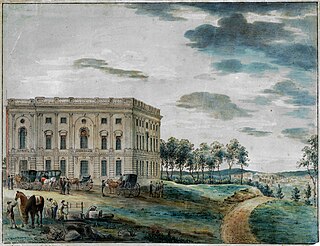
The 8th United States Congress was a meeting of the legislative branch of the United States federal government, consisting of the United States Senate and the United States House of Representatives. It met in Washington, D.C. from March 4, 1803, to March 4, 1805, during the last two years of Thomas Jefferson's first term in office. The apportionment of seats in the House of Representatives was based on the 1800 United States census. Both chambers had a Democratic-Republican majority.

The 1806–07 United States House of Representatives elections were held on various dates in various states between April 29, 1806 and August 4, 1807. Each state set its own date for its elections to the House of Representatives before the first session of the 10th United States Congress convened on October 26, 1807. They occurred during Thomas Jefferson's second term. Elections were held for all 142 seats, representing 17 states.
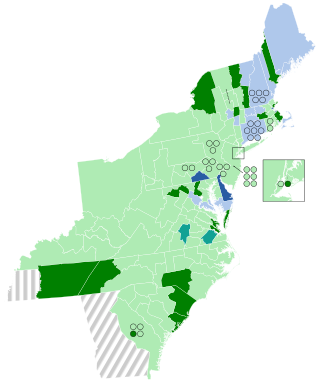
The 1804–05 United States House of Representatives elections were held on various dates in various states between April 24, 1804 and August 5, 1805. Each state set its own date for its elections to the House of Representatives before the first session of the 9th United States Congress convened on December 2, 1805. The elections occurred at the same time as President Thomas Jefferson's re-election. Elections were held for all 142 seats, representing 17 states.
Joseph Calhoun was a Democratic-Republican member of the South Carolina House of Representatives (1804–1805) and represented South Carolina in the United States House of Representatives (1807–1811). Born in Staunton in the Colony of Virginia, he moved with his father to the Province of South Carolina in 1756 and settled in Granville District, on Little River, near the present town of Abbeville.
Theodore Gaillard Hunt was an American lawyer and politician who served as a member of the U. S. House of Representatives representing the state of Louisiana. From 1853 to 1855, he served one term as a Whig.

Benjamin Huger was an American farmer and politician who served as a United States representative from South Carolina, serving three terms from 1799 to 1805, and a fourth term from 1815 to 1817.
The Euphradian Society, also known as Phi Alpha Epsilon (ΦΑΕ), is a collegiate debating and literary society founded in 1806 at the University of South Carolina, then known as South Carolina College.
John Taylor was a United States Representative from South Carolina. His birth date is unknown. Taylor was a member of the South Carolina House of Representatives, 1802–1805. He was elected as a Republican to the Fourteenth Congress but was an unsuccessful candidate for reelection to the Fifteenth Congress in 1816 and for election to the Seventeenth Congress in 1820. His death date is unknown.

Elections in South Carolina are held to fill various local, state and federal seats. Special elections may be held to fill vacancies at other points in time.

The second inauguration of Thomas Jefferson as president of the United States took place on Monday, March 4, 1805 in the Senate Chamber of the United States Capitol. The inauguration marked the commencement of the second four-year term of Thomas Jefferson as president and the first four-year term of George Clinton as vice president. Giving the oath of office was Chief Justice John Marshall.
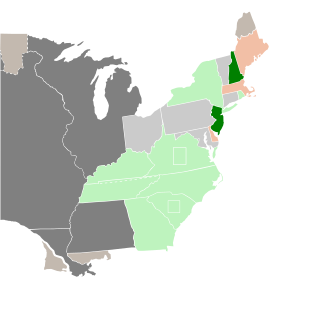
The 1804–05 United States Senate elections were held on various dates in various states. As these U.S. Senate elections were prior to the ratification of the Seventeenth Amendment in 1913, senators were chosen by state legislatures. Senators were elected over a wide range of time throughout 1804 and 1805, and a seat may have been filled months late or remained vacant due to legislative deadlock. In these elections, terms were up for the senators in Class 2.

The 1802–03 United States Senate elections were held on various dates in various states. As these U.S. Senate elections were prior to the ratification of the Seventeenth Amendment in 1913, senators were chosen by state legislatures. Senators were elected over a wide range of time throughout 1802 and 1803, and a seat may have been filled months late or remained vacant due to legislative deadlock. In these elections, terms were up for the senators in Class 1.

The 1800 United States presidential election in Pennsylvania took place on December 1, 1800 during a special session of the Pennsylvania General Assembly. Members of the bicameral state legislature chose 15 electors to represent Pennsylvania in the Electoral College as part of the 1800 United States presidential election. Eight Democratic-Republican electors and seven Federalist electors were selected. Unlike in the previous election, when one elector split his ballot between Republican Thomas Jefferson and Federalist Thomas Pinckney, all 15 electors followed the party line, with the Republicans voting for Jefferson and the Federalists for incumbent President John Adams. This was the first and only U.S. presidential election in which Pennsylvania's electors were not chosen by popular vote.

A special election was held in North Carolina's 5th congressional district on August 8, 1805 to fill a vacancy left by the death of Representative James Gillespie (DR) on January 5, 1805, before the 9th Congress began, but after the general elections had taken place for the 8th Congress.

The 2020 United States House of Representatives elections in South Carolina were held on November 3, 2020, to elect the seven U.S. representatives from the state of South Carolina, one from each of the state's seven congressional districts. The elections coincided with the 2020 U.S. presidential election, as well as other elections to the House of Representatives, elections to the United States Senate and various state and local elections.
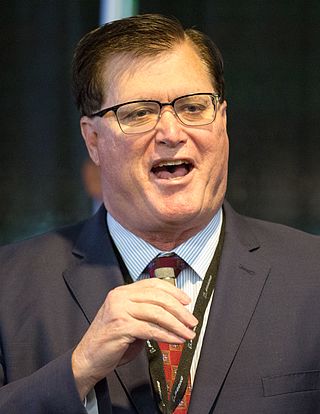
The 2018 South Carolina House of Representatives elections took place as part of the biennial United States elections. South Carolina voters elected state representatives in all 124 of the state house's districts. State representatives serve two-year terms in the South Carolina State House. A statewide map of South Carolina's state House districts can be obtained from the South Carolina House's website here, and individual district maps can be obtained from the U.S. Census here.
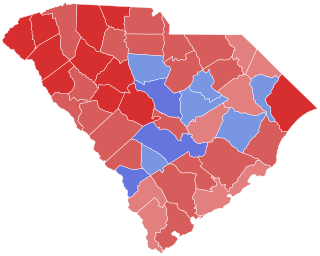
The 2022 United States Senate election in South Carolina was held on November 8, 2022, to elect a member of the United States Senate to represent the state of South Carolina. Incumbent senator Tim Scott won reelection to a second full term, defeating state representative Krystle Matthews. This was the third consecutive election for this seat where both major party nominees were black.

The 1805 New Hampshire gubernatorial election took place on March 12, 1805. Incumbent Federalist Governor John Taylor Gilman was defeated for re-election by Democratic-Republican candidate, former Governor and U.S. Senator John Langdon in a re-match of the previous year's election.














